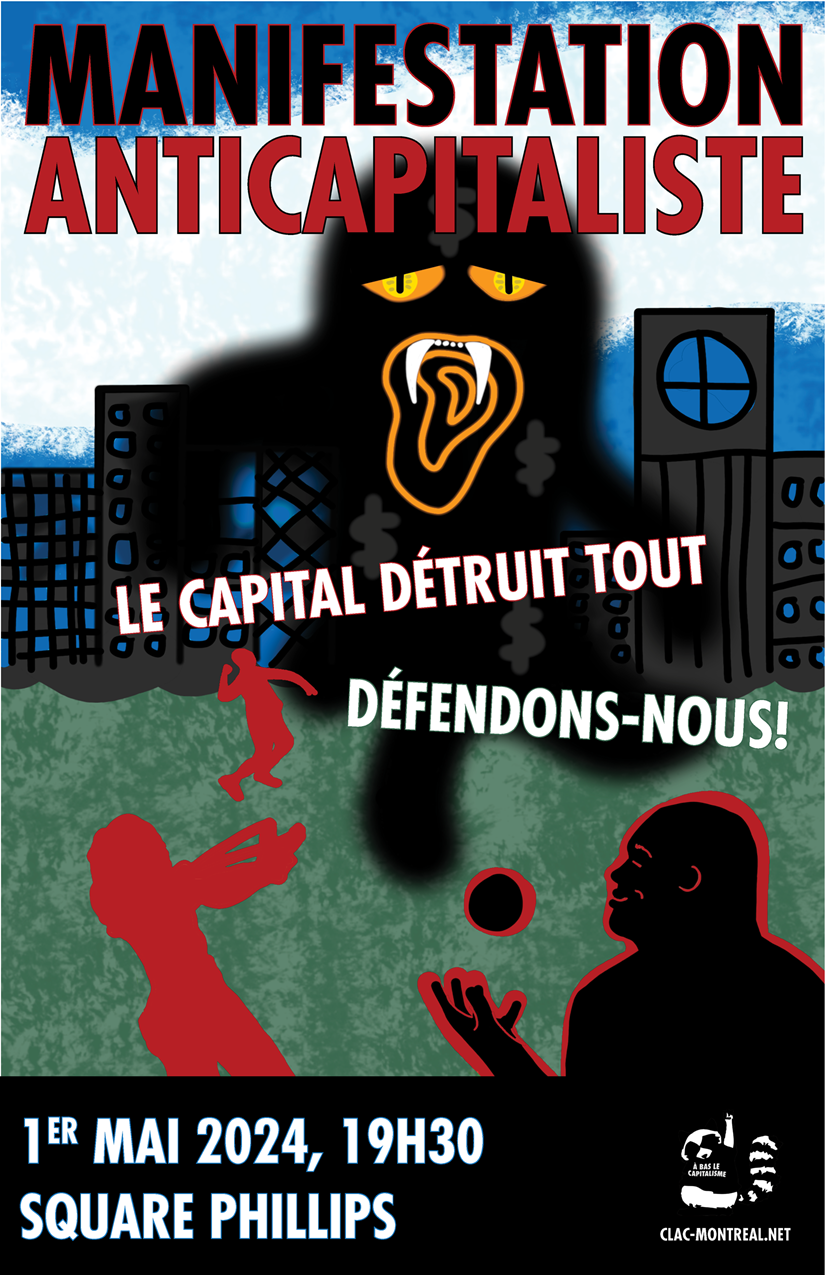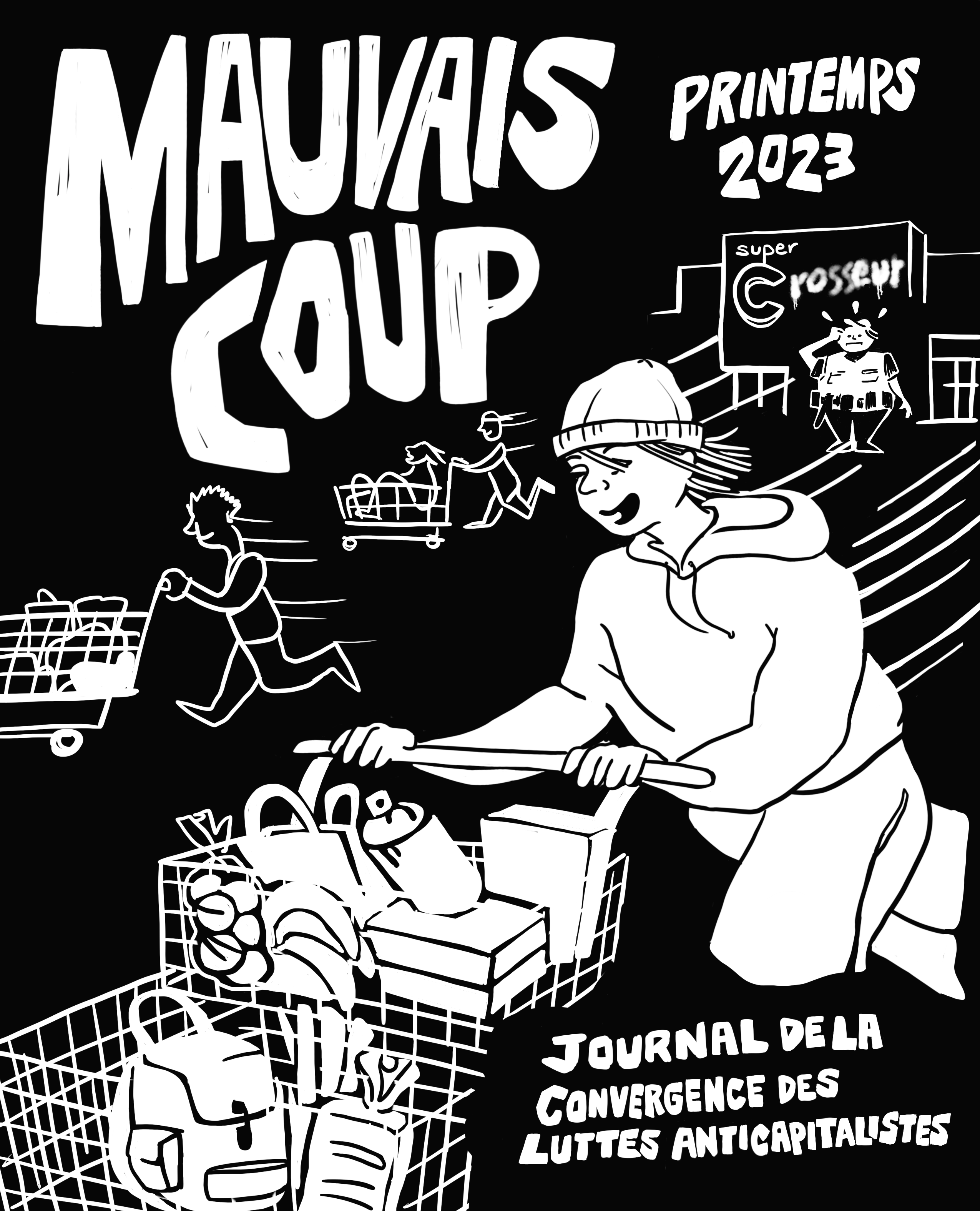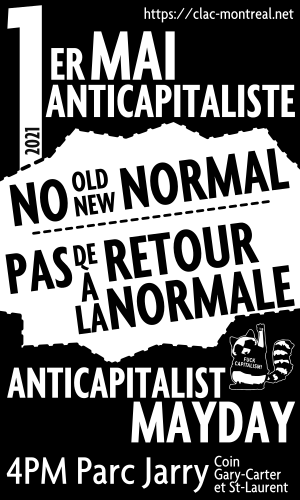Class War / Guerre des classes
Ciné-raton: Les patrons ont toujours tort!
Ciné-raton: Les patrons ont toujours tort!
Event Projections
Anticapitalist mayday '24: capital destroys everything: let's defend ourselves!
Anticapitalist mayday '24: capital destroys everything: let's defend ourselves!

The anticapitalist convergence (CLAC) invites you to the anti-capitalist demonstration on May 1. 🦝 Once again this year, there's no shortage of reasons to demonstrate! This year, the state and capital have stepped up their attacks on tenants, queers, ecology, Gazans and workers.
Le REM, ou comment faire payer les pauvres pour les riches
Le REM, ou comment faire payer les pauvres pour les riches
Le sous-investissement chronique volontaire dans le transport en commun a créé une opportunité économique: il devient possible de mettre en place un système de transport qui vise à faire des profits, en parallèle d’un système de transport à but non lucratif, la STM.1 En effet, la CDPQ a mis en place un modèle particulier pour le REM, regroupant des investissement provinciaux, fédéraux et de la CDPQ-Infra. À cela s’ajoute une redevance sur les constructions périphériques au projet.
Contre le réformisme et la sociale-démocratie: vive la révolution!
Contre le réformisme et la sociale-démocratie: vive la révolution!
1. Introduction
Journal Article Mauvais Coup (2023)
Show bénéfice pour une arrêtée du 1er mai 2021!
Show bénéfice pour une arrêtée du 1er mai 2021!
 Oyé oyé, La police nous fait chier, intimide et tue. Une camarade trans s’est fait arrêtée avec un feu d’artifice dans le cadre de la manifestation anticapitaliste du 1er mai 2021 et l’État confond visiblement un feu d’artifice avec une arme à feu, puisque celle-ci risque la prison. La judiciarisation de cette camarade est particulièrement inquiétante, elle risque de créer un dangereux précédent quant aux conséquences légales d’utiliser des feux d’artifice en manifestation.
Oyé oyé, La police nous fait chier, intimide et tue. Une camarade trans s’est fait arrêtée avec un feu d’artifice dans le cadre de la manifestation anticapitaliste du 1er mai 2021 et l’État confond visiblement un feu d’artifice avec une arme à feu, puisque celle-ci risque la prison. La judiciarisation de cette camarade est particulièrement inquiétante, elle risque de créer un dangereux précédent quant aux conséquences légales d’utiliser des feux d’artifice en manifestation.
Lancement du journal Mauvais Coup
Lancement du journal Mauvais Coup

Vous êtes invité-e-s au lancement de “Mauvais coup", le journal officiel de la CLAC pour le 1er mai 2023. Le tout se passera au Centre Social Anarchiste de l'Achoppe le 30 mars à partir de 19:00.
Au menu: Présentation du journal suivie d'interventions des groupes Ben Trop Cher! et SLAM-MATU, qui y ont collaboré, activités ludiques et musique militante!
**********
Y’all are invited on March 30th to the launch of “Mauvais coup”, the 2023 edition of the CLAC’s journal May 1st. The event will be held on March 30, at the Achoppe anarchist social center, beginning à 7PM.
There will be a presentation of the journal, interventions by Ben trop cher! and SLAM-MATU who collaborated in the journal, fun games and activist music!
We will also distribute posters and flyers for the mayday anticapitalist demo.
Anticapitalist May Day 2023 - Impossible to Exist; Capitalism to Blame!
Anticapitalist May Day 2023 - Impossible to Exist; Capitalism to Blame!

While the situation in Canada is less catastrophic than in other parts of the world, we are all feeling the weight of increasingly worrisome inflation. Prices are rising faster than wages and we are left with no real leverage to act on the situation. In the neoliberal order, the bourgeois do what they want and people suffer without saying a word. Rents, groceries and transport are an increasing burden on us, and it is a safe bet that things will not get any better.
Anticapitalist Mayday '22: Colonial and Ecocidal, Capitalism is war!
Anticapitalist Mayday '22: Colonial and Ecocidal, Capitalism is war!

Event Manifestations
Non à la relance destructrice: ateliers de réflexion sur le développement capitaliste et colonial
Non à la relance destructrice: ateliers de réflexion sur le développement capitaliste et colonial
 Les ateliers se tiendront un samedi sur deux, a partir de la mi-juillet, à 19h dans la cour du DIRA (2035 Saint-Laurent):
17 juillet : Historique du rôle des infrastructures de transport et de communication dans le projet capitaliste colonial québécois
31 juillet : Réaménagement du territoire en cours et à venir : la stratégie maritime du Québec
14 aout : Résistances à la réorganisation urbaine, stratégies et pratiques
Les ateliers se tiendront un samedi sur deux, a partir de la mi-juillet, à 19h dans la cour du DIRA (2035 Saint-Laurent):
17 juillet : Historique du rôle des infrastructures de transport et de communication dans le projet capitaliste colonial québécois
31 juillet : Réaménagement du territoire en cours et à venir : la stratégie maritime du Québec
14 aout : Résistances à la réorganisation urbaine, stratégies et pratiques
Event Teach-ins/Conférences
MayDay 2021: We don’t want this world they are trying to sell us!
MayDay 2021: We don’t want this world they are trying to sell us!

- MayDay 2021: We don’t want this world they are trying to sell us!
- Meet up at 4PM at Jarry park, at the corner of Gary-Carter and St-Laurent.
The pandemic we are mired in precarize everyone and highlights serious injustices. The stimulus wished by the leaders is an economic stimulus which is not addressed to us. It is not addressed to the artists and other people who don’t make enough profit to merit the right to exist. It does not concern sex workers, whose existence itself is still criminalized. This stimulus ignores handicapped people, the marginalized, those with mental health issues. The stimulus they talk about, it is for the oil companies, the Bombardier corporations, the party friends like Guzzo, but it is not for us. To let the governments save us from the crisis they created themselves through the constant cuts to healthcare and through their "snowbird" lives, would be to accept death. What we need to stimulate is not the economy, but the struggles for our rights and the end of capitalist exploitation.
This MayDay, resistance continues despite the confinement!
This MayDay, resistance continues despite the confinement!

In these times of pandemic, capital kills more than ever. Workers are left without equipment in hospitals. Confinement falls upon us because our government did too little, too late. Rich landlords who brought the virus back from their latest trip are angered by a rent strike that their penniless tenants have no other choice but to partake in. The people dying right now are among the most vulnerable, from grocery store clerks, to delivery workers, prisoners, homeless folks, and undocumented migrants. All of this while the most fortunate get to work from home. Nevertheless, social distancing remains an important way to reduce transmission, and this is why WE WILL NOT MEET PHYSICALLY FOR A MAYDAY PROTEST. We will however try to make resistance as visible as possible, given the difficult context.
Antiracist and Anticapitalist Contingent at the Climate Strike March
Antiracist and Anticapitalist Contingent at the Climate Strike March

The fight against climate change must break out of its rut. It must also fight the system of borders which benefits certain lives more than others. It must crush this capitalist economy which is always looking to produce more, more and more. It must fight the migrant prison being built in Laval, in which children are raised behind bars. It must fight imperialism which forces countries of the South to produce for a pittance what we consume here in the North. It must fight white supremacy, whether it takes the form of neo-fascist militia, conservative talking heads, or colonial governments which impose their law on unceded native lands. It must fight those who benefit from poisoning the Earth and from the exploitation of our sisters and brothers.
Event Contingents
Anticapitalist MayDay 2019 - Cabot Square - 6:30PM
Anticapitalist MayDay 2019 - Cabot Square - 6:30PM

- On Wednesday May 1st, at 6:30pm, in Square Cabot, the anticapitalist caravan is back at it again to say fuck your borders and fuck your prisons!
- Meetup at 6:30 in Cabot square (Atwater metro station).
Revolution Fest V !
Revolution Fest V !

C'est demain jeudi que commence la cinquième édition du Revolution Fest de Montréal !
3 jours de musique sous la bannière de l’anticapitalisme, de l’antifascisme et du féminisme!
Lancé pour la première fois à l’automne 2013 par le chapitre montréalais des Red and Anarchist SkinHeads (RASH) et du Montreal Sisterhood, le Revolution Fest se veut un festival annuel présentant des groupes de musiques et des activités à caractère politique. Ce festival se déroulant sur plusieurs journées dans la ville de Montréal, permet à l’ensemble de la gauche de se rassembler, et ce, dans un cadre festif et de faire la promotion d’une contre-culture vivante et radicalement opposée à toutes les formes que prend l’extrême droite.
Le 21 avril, jour du printemps des banques
Le 21 avril, jour du printemps des banques

NOS POCHES SE VIDENT, CELLES DES BANQUES DÉBORDENT ! ALLONS CHERCHER L'ARGENT LÀ OÙ IL SE TROUVE !
Perturbons l'assemblée annuelle des actionnaires de la Banque Nationale !
- Vendredi 21 avril 2017, 09h,
- Coin de la Gauchetière et de la Côte du Beaver Hall
